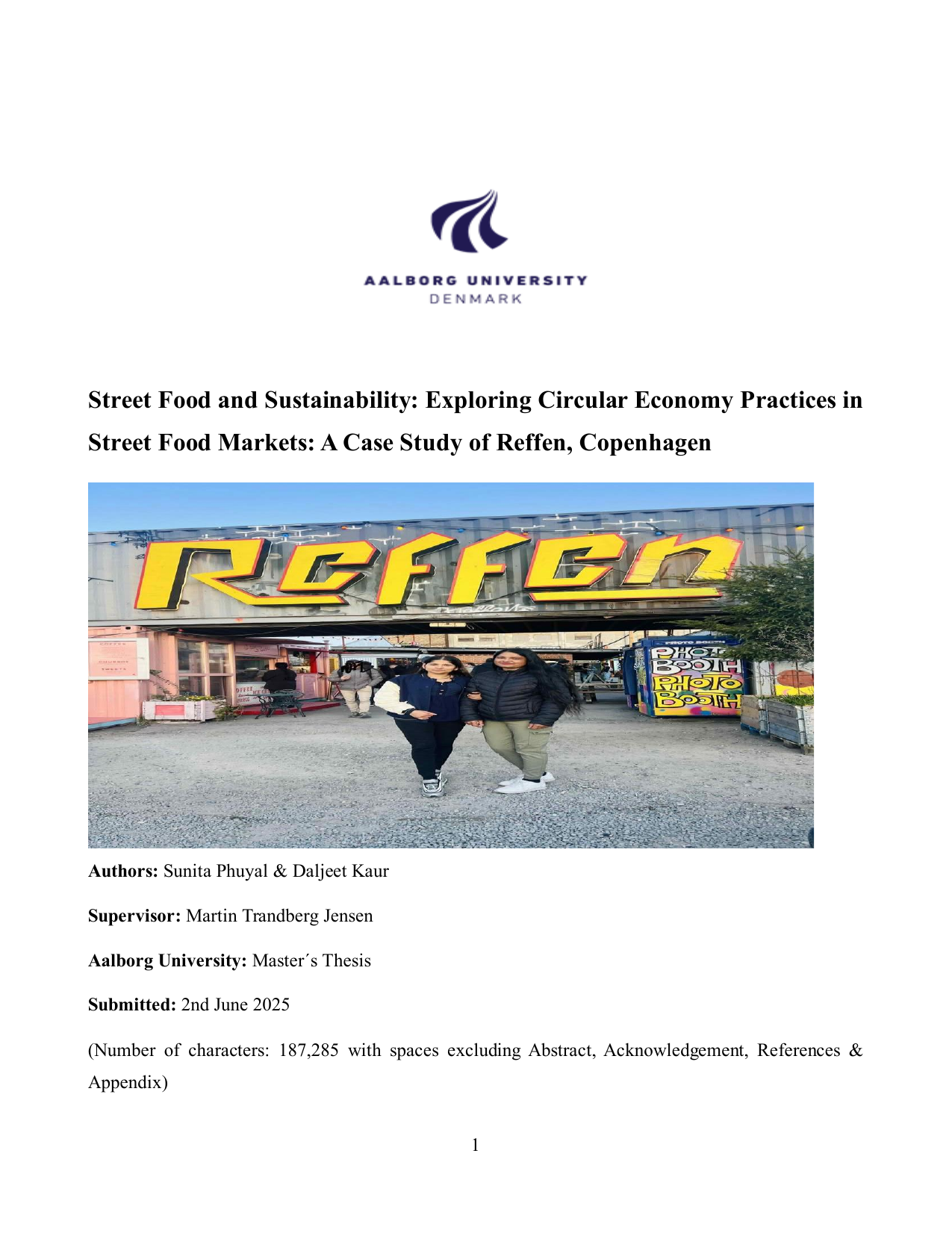
Street Food and Sustainability: Exploring Circular Economy Practices in Street Food Markets: A Case Study of Reffen, Copenhagen: Street food Market Reffen and Vendors Circular Economy Practices
Translated title
Street Food and Sustainability: Exploring Circular Economy Practices in Street Food Markets: A Case Study of Reffen, Copenhagen: Street food and Circular Economy
Authors
Term
4. term
Education
Publication year
2025
Submitted on
2025-06-02
Pages
100
Abstract
Abstract Purpose: The purpose of this study is to explore the day-to-day practices of Reffen’s Street Food vendors through the lens of Practice Theory, either the vendor every day practices support or challenge the market’s claim of being a sustainable, circular economy space. Design/methodology/approach: The study is based on an ethnographic approach as part of a qualitative case study. Data was collected through Semi-structure interviews with 12 vendors at Reffen, informal talk, observation, field visit, and field notes. Findings: The finding outlines that there is a gap between the Reffen branding and Vendors actual practice. Under the element of Materials Vendors have just one or two general bins in the stalls, and lacks sorting waste effectively. The central food sorting containers placed by Reffen Management seems to be completely empty during the observation time. The study outlines inconsistent vendor competencies, some vendors staff do not have basic knowledge of sustainability or circularity, those Vendors who have knowledge is also driven by personal values, cultural background or previous long term work experience in related field rather than any structured training offered by Reffen. In terms of meaning, Reffen has promoted itself as a sustainable and circular market. However, lacks shared internalized meaning among vendors. Also, symbolic frame reflecting sign, bord, promoting sustainability or circularity were not visible to make customers aware. Moreover, Reffen has not fostered a shared sense of community around circular values in comparison to advanced models like Tivoli and KleanHub´s reusable, Re-washable cup, containers system. Research limitations: The study outlines only 12 vendors interviews of 2025 season and observation and interview time period was from March to May 2025. Every season there is a new or rotation of vendors. Therefore, interviewing more vendors, with longer observation and seasonal comparison is recommended. Also, the study Lack Reffen´s management perspective. Practical implications: The findings and suggestions of this study have important implications for urban street food markets. In real world practices how sustainability and circular economy Principles can be designed, implemented or can have challenges. The insights can help market organizers, urban planners recognize the importance of Material infrastructure (waste sorting, reusable packaging or reduce single use packaging), improving vendors competencies through structured training, peer learning and foster shared cultural values and motivations. Originality/value: This study offers to address the research gap applying Practice Theory and its three key elements Materials, Competencies, and Meanings to critically analyze Reffen vendors everyday practices highlighting the gap between policy claim by the Reffen and the actual on the ground realities of vendors towards sustainable or circular practice. However, some practices and Reffen concepts could be leading example for many developing countries in the street food market where they lack even basic facilities.
Abstract Purpose: The purpose of this study is to explore the day-to-day practices of Reffen’s Street Food vendors through the lens of Practice Theory, either the vendor every day practices support or challenge the market’s claim of being a sustainable, circular economy space. Design/methodology/approach: The study is based on an ethnographic approach as part of a qualitative case study. Data was collected through Semi-structure interviews with 12 vendors at Reffen, informal talk, observation, field visit, and field notes. Findings: The finding outlines that there is a gap between the Reffen branding and Vendors actual practice. Under the element of Materials Vendors have just one or two general bins in the stalls, and lacks sorting waste effectively. The central food sorting containers placed by Reffen Management seems to be completely empty during the observation time. The study outlines inconsistent vendor competencies, some vendors staff do not have basic knowledge of sustainability or circularity, those Vendors who have knowledge is also driven by personal values, cultural background or previous long term work experience in related field rather than any structured training offered by Reffen. In terms of meaning, Reffen has promoted itself as a sustainable and circular market. However, lacks shared internalized meaning among vendors. Also, symbolic frame reflecting sign, bord, promoting sustainability or circularity were not visible to make customers aware. Moreover, Reffen has not fostered a shared sense of community around circular values in comparison to advanced models like Tivoli and KleanHub´s reusable, Re-washable cup, containers system. Research limitations: The study outlines only 12 vendors interviews of 2025 season and observation and interview time period was from March to May 2025. Every season there is a new or rotation of vendors. Therefore, interviewing more vendors, with longer observation and seasonal comparison is recommended. Also, the study Lack Reffen´s management perspective. Practical implications: The findings and suggestions of this study have important implications for urban street food markets. In real world practices how sustainability and circular economy Principles can be designed, implemented or can have challenges. The insights can help market organizers, urban planners recognize the importance of Material infrastructure (waste sorting, reusable packaging or reduce single use packaging), improving vendors competencies through structured training, peer learning and foster shared cultural values and motivations. Originality/value: This study offers to address the research gap applying Practice Theory and its three key elements Materials, Competencies, and Meanings to critically analyze Reffen vendors everyday practices highlighting the gap between policy claim by the Reffen and the actual on the ground realities of vendors towards sustainable or circular practice. However, some practices and Reffen concepts could be leading example for many developing countries in the street food market where they lack even basic facilities.
Documents
